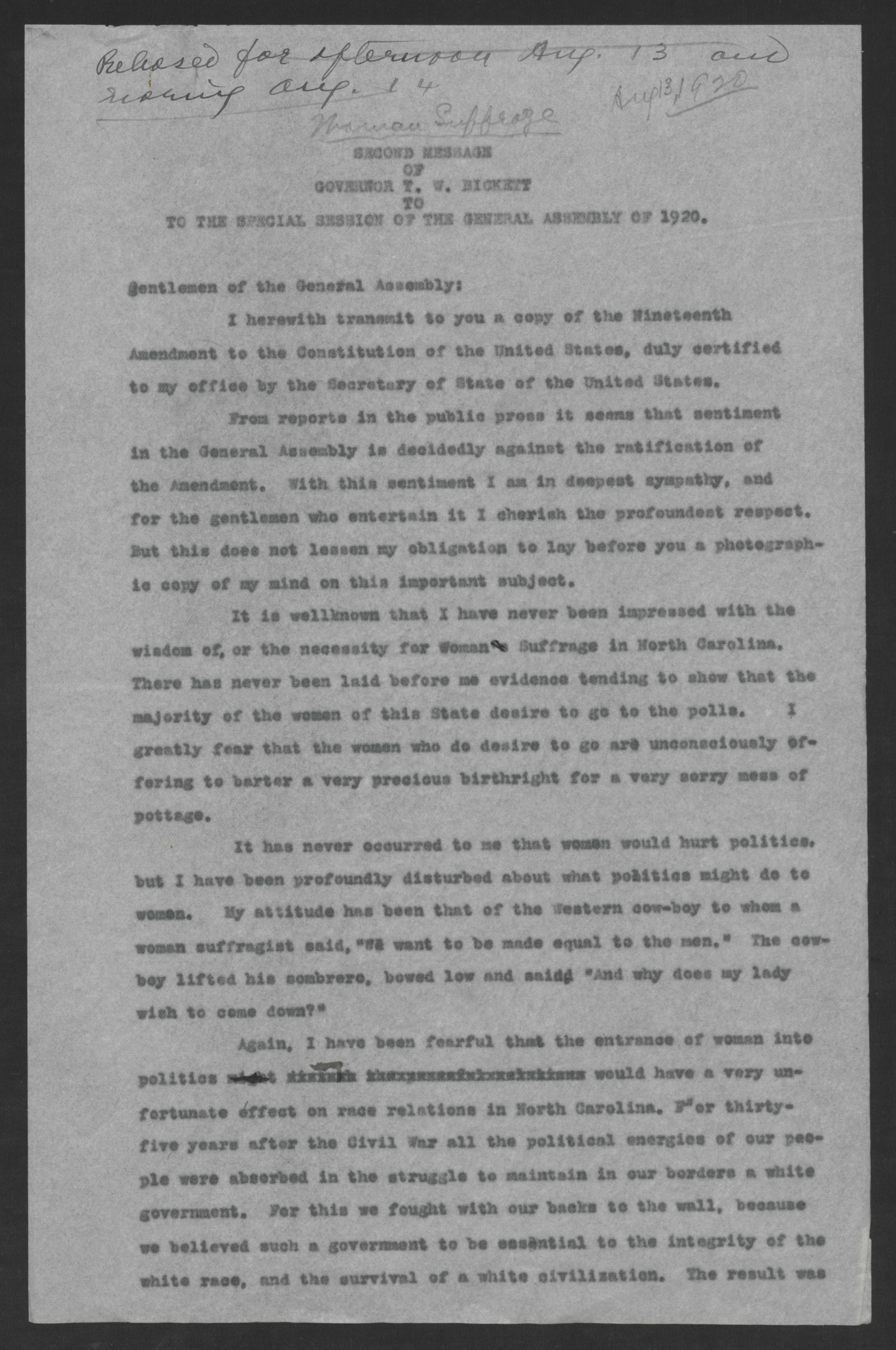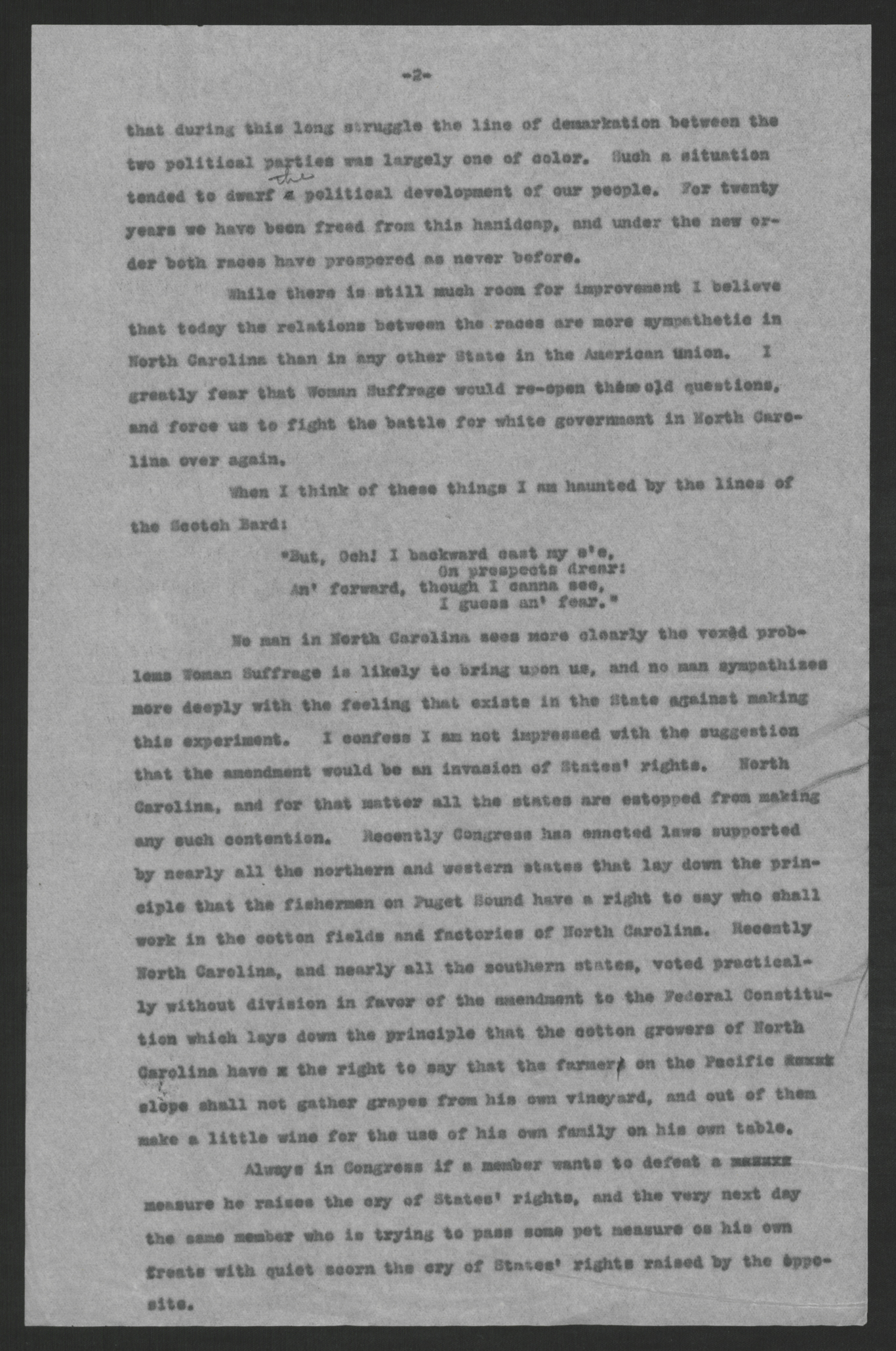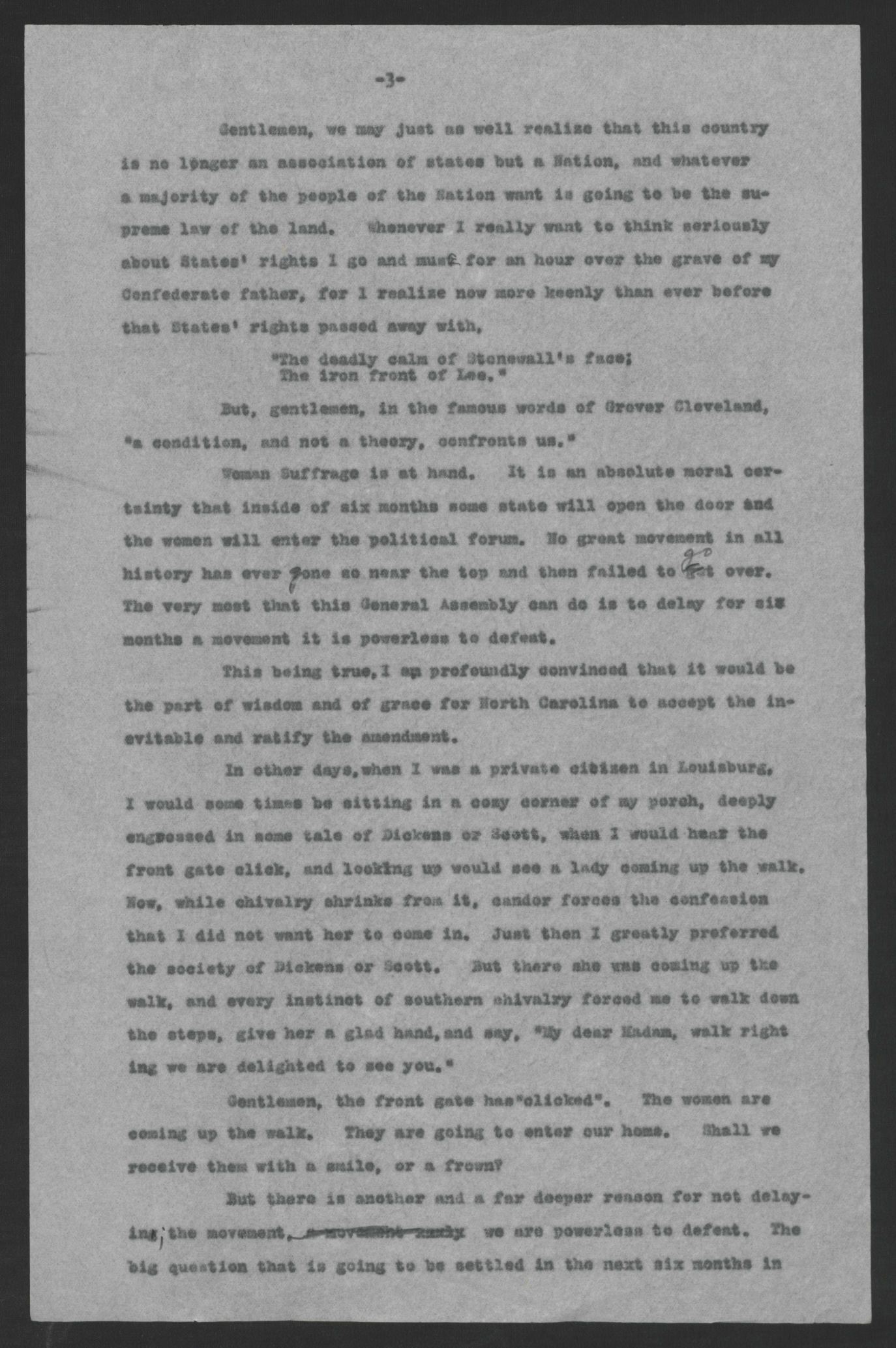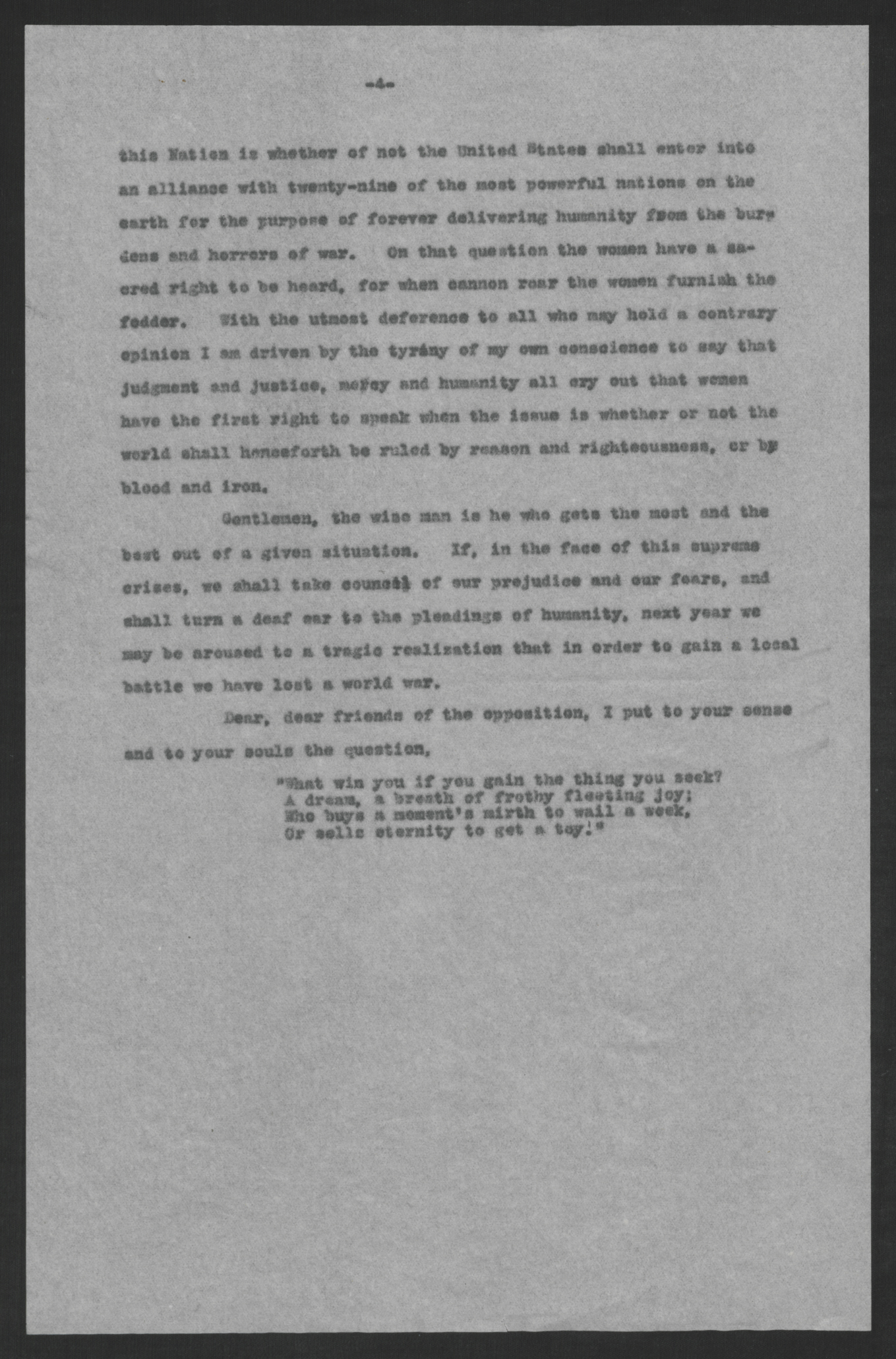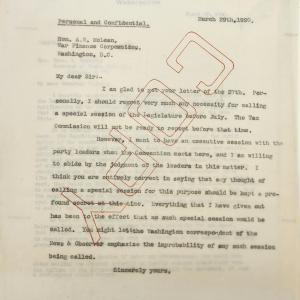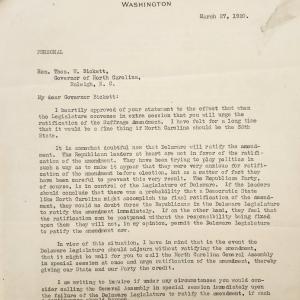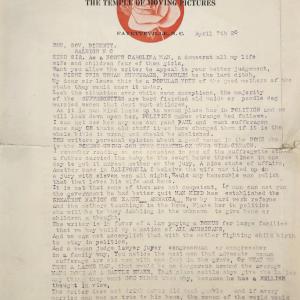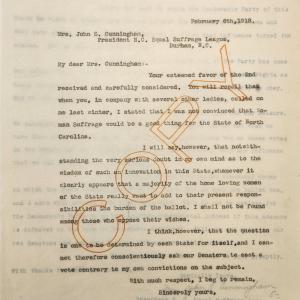Released for afternoon Aug. 13 and [illegible] Aug. 14
Aug 13, 1920
Woman Suffrage
SECOND MESSAGE
OF
GOVERNOR T. W. BICKETT
TO
TO THE SPECIAL SESSION OF THE GENERAL ASSEMBLY OF 1920.
Gentlemen of the General Assembly:
I herewith transmit to you a copy of the Nineteenth Amendment to the Constitution of the United States, duly certified to my office by the Secretary of State of the United States.
From reports in the public press it seems that sentiment in the General Assembly is decidedly against the ratification of the Amendment. With this sentiment I am in deepest sympathy, and for the gentlemen who entertain it I cherish the profoundest respect. But this does not lessen my obligation to lay before you a photographic copy of my mind on this important subject.
It is wellknown that I have never been impressed with the wisdom of, or the necessity for Woman Suffrage in North Carolina. There has never been laid before me evidence tending to show that the majority of the women of this State desire to go to the polls. I greatly fear that the women who do desire to go are unconsciously offering to barter a very precious birthright for a very sorry mess of pottage.
It has never occurred to me that women would hurt politics, but I have been profoundly disturbed about what politics might do to women. My attitude has been that of the Western cow-boy to whom a woman suffragist said, “We want to be made equal to the men.” The cow-boy lifted his sombrero, bowed low and said, “And why does my lady wish to come down?”
Again, I have been fearful that the entrance of woman into politics would have a very unfortunate effect on race relations in North Carolina. For thirty-five years after the Civil War all the political energies of our people were absorbed in the struggle to maintain in our borders a white government. For this we fought with our backs to the wall, because we believed such a government to be essential to the integrity of the white race, and the survival of a white civilization. The result was that during this long struggle the line of demarkation between the two political parties was largely one of color. Such a situation tended to dwarf <the> political development of our people. For twenty years we have been freed from this hanidcap, and under the new order both races have prospered as never before.
While there is still much room for improvement I believe that today the relations between the races are more sympathetic in North Carolina than in any other State in the American Union. I greatly fear that Woman Suffrage would re-open these old questions, and force us to fight the battle for white government in North Carolina over again.
When I think of these things I am haunted by the lines of the Scotch Bard:
“But, Och! I backward cast my e’e,
On prospects drear;
An’ forward, though I canna see,
I guess an’ fear.”
No man in North Carolina sees more clearly the vexed problems Woman Suffrage is likely to bring upon us, and no man sympathizes more deeply with the feeling that exists in the State against making this experiment. I confess I am not impressed with the suggestion that the amendment would be an invasion of States’ rights. North Carolina, and for that matter all the states are stopped from making any such contention. Recently Congress has enacted laws supported by nearly all the northern and western states that lay down the principle that the fishermen on Puget Sound have a right to say who shall work in the cotton fields and factories of North Carolina. Recently North Carolina, and nearly all the southern states, voted practically without division in favor of the amendment to the Federal Constitution which lays down the principle that the cotton growers of North Carolina have the right to say that the farmer on the Pacific slope shall not gather grapes from his own vineyard, and out of them make a little wine for the use of his own family on his own table.
Always in Congress if a member wants to defeat a measure he raises the cry of States’ rights, and the very next day the same member who is trying to pass some pet measure of his own treats with quiet scorn the cry of States’ rights raised by the opposite.
Gentlemen, we may just as well realize that this country is no longer an association of states but a Nation, and whatever a majority of the people of the Nation want is going to be the supreme law of the land. Whenever I really want to think seriously about States’ rights I go and muse for an hour over the grave of my Confederate father, for I realize now more keenly than ever before that States’ rights passed away with,
“The deadly calm of Stonewall’s face;
The iron front of Lee.”
But, gentlemen, in the famous words of Grover Cleveland, “a condition, and not a theory, confronts us.”
Woman suffrage is at hand. It is an absolute moral certainty that inside of six months some state will open the door and the women will enter the political forum. No great movement in all history has ever gone so near the top and then failed to go over. The very most that this General Assembly can do is to delay for six months a movement it is powerless to defeat.
This being true, I am profoundly convinced that it would be the part of wisdom and of grace for North Carolina to accept the inevitable and ratify the amendment.
In other days, when I was a private citizen in Louisburg, I would some times be sitting in a cozy corner of my porch, deeply engrossed in some tale of Dickens or Scott, when I would hear the front gate click, and looking up would see a lady coming up the walk. Now, while chivalry shrinks from it, candor forces the confession that I did not want her to come in. Just then I greatly preferred the society of Dickens or Scott. But there she was coming up the walk, and every instinct of southern chivalry forced me to walk down the steps, give her a glad hand, and say, “My dear Madam, walk right in we are delighted to see you.”
Gentlemen, the front gate has “clicked.” The women are coming up the walk. They are going to enter our home. Shall we receive them with a smile, or a frown?”
But there is another and a far deeper reason for not delaying the movement we are powerless to defeat. The big question that is going to be settled in the next six months in this Nation is whether or not the United States shall enter into an alliance with twenty-nine of the most powerful nations on the earth for the purpose of forever delivering humanity from the burdens and horrors of war. On that question the women have a sacred right to be heard, for when cannon roar the women furnish the fodder. With the utmost deference to all who may hold a contrary opinion I am driven by the tyrany of my own conscience to say that judgment and justice, mercy and humanity all cry out that women have the first right to speak when the issue is whether or not the world shall henceforth be ruled by reason and righteousness, or by blood and iron.
Gentlemen, the wise man is he who gets the most and the best out of a given situation. If, in the face of this supreme crises, we shall take council of our prejudice and our fears, and shall turn a deaf ear to the pleadings of humanity, next year we may be aroused to a tragic realization that in order to gain a local battle we have lost a world war.
Dear, dear friends of the opposition, I put to your sense and to your souls the question,
“What win you if you gain the thing you seek?
A dream, a breath of frothy fleeting joy;
Who buys a moment’s mirth to wail a week,
Or sells eternity to get a toy.”

